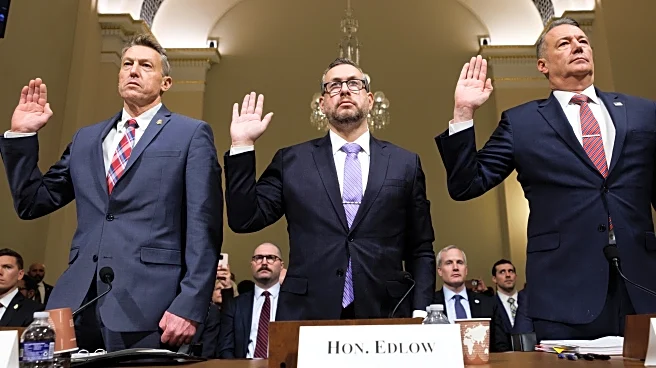What's Happening?
The United Nations climate talks held in Belem, Brazil, have concluded with an agreement to provide increased financial support to countries most affected by climate change. The deal includes a promise
of $1 trillion for energy grid improvements and infrastructure, $5.5 billion to preserve forests, and other funding initiatives. However, the agreement lacks a detailed plan to phase out fossil fuels, a point of contention among participating nations. Brazil and Colombia have pledged to develop an independent roadmap for fossil fuel transition, though it will not carry the same weight as a UN-approved plan. The conference, known as COP30, saw negotiations extend beyond the scheduled deadline, with delegates working through the night to finalize the deal.
Why It's Important?
The agreement is significant as it addresses the financial needs of vulnerable countries facing the impacts of climate change, such as extreme weather events. The commitment to substantial funding for energy infrastructure and forest preservation reflects a global effort to mitigate climate change effects. However, the absence of a concrete plan to phase out fossil fuels highlights ongoing challenges in achieving global consensus on climate action. This could impact the effectiveness of international efforts to reduce greenhouse gas emissions and transition to sustainable energy sources. The deal's financial provisions may benefit developing countries, but the lack of a fossil fuel phase-out plan could hinder progress in reducing global carbon emissions.
What's Next?
Brazil and Colombia's commitment to developing a fossil fuel transition roadmap suggests future efforts to address this critical issue. The roadmap, while independent, may influence international climate policy and encourage other nations to adopt similar strategies. The agreement's financial commitments will require implementation and monitoring to ensure funds are effectively utilized. Nations will need to strengthen their emissions reduction plans to meet global climate goals. The outcome of COP30 may prompt further discussions and negotiations at future climate conferences, as countries continue to grapple with the complexities of transitioning away from fossil fuels.
Beyond the Headlines
The agreement's focus on financial aid underscores the ethical responsibility of wealthier nations to support those disproportionately affected by climate change. The lack of a fossil fuel phase-out plan raises questions about the influence of oil-producing countries in climate negotiations. This could lead to long-term shifts in global energy policies, as nations balance economic interests with environmental responsibilities. The conference's outcome may also impact public perception of international climate efforts, potentially influencing grassroots movements and advocacy for stronger climate action.











